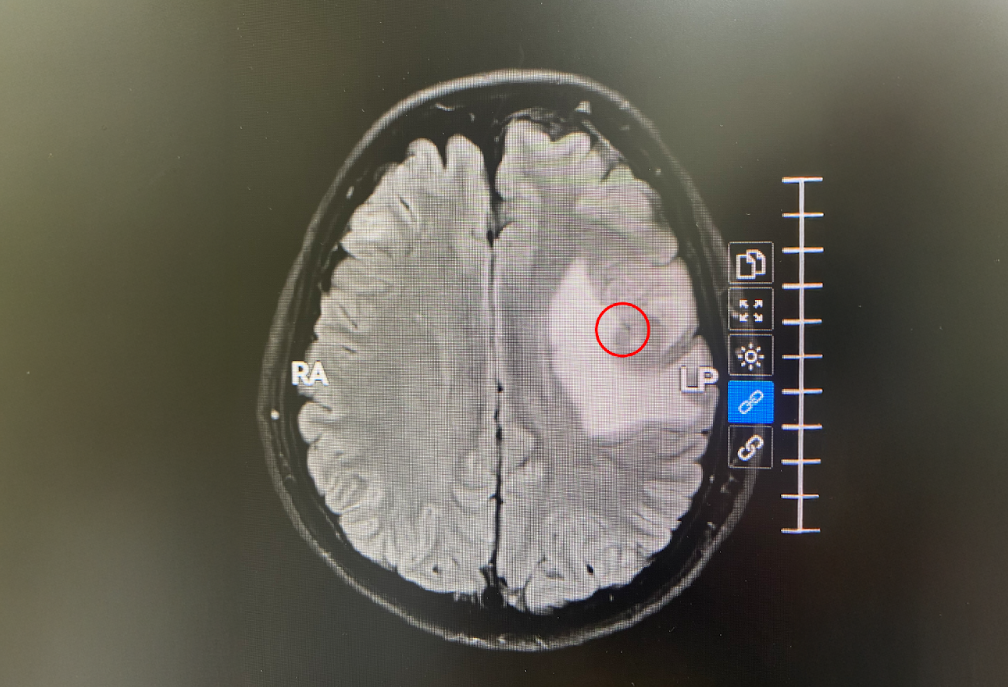Initially, Ngoc's symptoms resembled dry eyes, vertigo, and perimenopause. Medication provided no relief. Doctors at a hospital discovered pleural effusion and a biopsy confirmed stage 4 lung cancer. The cancer had spread to her brain, bones, mediastinal lymph nodes, and supraclavicular lymph nodes.
Ngoc sought treatment at Tam Anh General Hospital in TP HCM, experiencing blurred vision, difficulty speaking, swelling in her left hand, and shortness of breath. Dr. Ngo Tuan Phuc, from the Oncology Department, explained that the rapidly growing brain metastasis caused surrounding cerebral edema, scattered lesions in both hemispheres and the cerebellum, and compression of the left lateral ventricle, leading to her symptoms.
 |
Brain metastasis (red area) causing swelling in the surrounding brain tissue. Photo: *Tam Anh General Hospital* |
Doctors determined that Ngoc's severe intracranial hypertension prevented immediate brain radiation therapy. The medical team prescribed medication to reduce brain swelling, performed a biopsy of the right cervical lymph node, and conducted gene sequencing. The results revealed ALK and TP53 gene mutations.
According to Dr. Phuc, ALK gene mutations account for 4.4-6.7% of non-small cell lung cancer cases and are often detected when the cancer has metastasized to the brain or during advanced stages. TP53 mutations are more common, often associated with a poorer prognosis and less responsiveness to treatment. Ngoc was prescribed targeted therapy specific to the ALK mutation to inhibit the activity of the mutated gene, control her symptoms, slow disease progression, and prolong her life.
After more than 17 months of treatment, Ngoc's health is stable. She continues taking medication and attends regular follow-up appointments.
 |
Dr. Phuc consulting with a patient. Photo: *Tam Anh General Hospital* |
Lung cancer has a high potential for metastasis, often affecting the brain, bones, liver, adrenal glands, and lymph nodes. Cancer cells can enter the bloodstream or lymphatic system, travel to the brain, and cross the blood-brain barrier to form secondary tumors.
Symptoms of lung cancer that has metastasized to the brain vary depending on the number, location, and size of the brain tumors. Common symptoms include persistent headaches, blurred vision, dizziness, memory loss, difficulty concentrating, movement disorders, weakness in the limbs, speech impairment, and behavioral changes.
Treatment options for lung cancer brain metastasis include radiation therapy, targeted therapy, chemotherapy, and immunotherapy. Radiation therapy uses guided radiation beams to destroy cancer cells in the brain. Lung cancer patients may receive one or a combination of these treatments for optimal results.
Lung cancer often presents no noticeable symptoms in its early stages and is typically discovered after it has spread. Regular screening with low-dose CT scans helps detect the disease early, increasing the chances of successful treatment and improving quality of life.
Dr. Phuc recommends regular lung cancer screenings for high-risk individuals, including those between 50 and 80 years old, with a history of heavy smoking, exposure to toxins (asbestos, industrial gases), or a family history of lung cancer. Patients undergoing treatment should attend follow-up appointments as scheduled and seek immediate medical attention if they experience unusual symptoms like headaches, blurred vision, dizziness, or limb weakness for prompt evaluation and intervention.
Bao Tram
| Readers can submit questions about cancer here for doctors to answer. |












